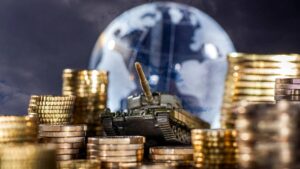Post bailout, humiliation and takeover, Credit Suisse says what the hell: Buy Weapons, Tobacco, Industrial Gases and Fossil Fuels

A good time for guns. Via Getty
After eating its rival Credit Suisse, the share price of UBS has fallen almost -9%, entirely failing to reassure investors that none of this is really happening.
The Credit Suisse share price, on the other hand, has been repeatedly hit with a -63.7% naughty stick since Monday last week. Well. They have been a very bad Swiss bank.
Overnight, European stock markets opened lower.
At 9:25am in Paris, the market was down by 0.8%. In Frankfurt by -1.1% and London by -1%, the dark week for global banking looks set to continue.
The sector began falling in Europe as soon as it could – BNP Paribas opened down -8%, and even Deutsche Bank shed a quick 5%.
What’s fascinating is this Defensive Environment play sheet sent out on Sunday from none other than Credit Suisse, who appears to have shed any semblance of ESG etc and advises how to deal best with the ‘several macro red flags’ that investors should not ignore:
1. The US yield curve last failed to predict a recession at this level of inversion in 1964
2. Lead indicators are consistent with a recession
3. Service sector inflation is double the Fed’s desired levels (requiring 4.5%-5.0% unemployment to address it, which in turn requires GDP growth of zero for 6 months)
4. The lags in monetary policy are much longer than normal, increasing the risk of overkill
5. Already bank lending conditions are consistent with a very sharp slowdown in growth, even before a further tightening that is likely after recent events
Credit Suisse: Just buy these you’ll be sweet
Fortunately CS seems to have ripped off the veneer of social responsibility and has a bunch of “Preferred Defensive Exposures” for exactly this situation:
1. Tobacco: Outperforms 75% of the time from this level of valuation discount. BAT and Imperial Brands are preferred exposures
2. Diversified Financials. Insurance names and LSE Group. Credit Suisse believes that insurance is in somewhat of a super-cycle with higher rates, premium rate increases; the sector has almost no correlation with industrial activity
3. Industrial Gases: Strong end market growth (hydrogen $2.5trn by 2050 and carbon capture $4trn by 2050). Defensive due to contract length (two thirds of contracts are 5-15yrs); the sector tends to outperform 60-80% of the time from current P/E relatives. Air Liquide has 85% of the European hydrogen pipeline
4. Defence: We have moved to a multipolar world (US, China, Russia, and Europe). If defence spending as a percentage of GDP went back to its post-1960 average, defence spending would rise by ~75% and 67% in the US and in Europe, respectively.
We have seen several examples of major changes in defence spending says CS:
- Japan increased its defence spending by 57% over the previous five years, China committed to a real increase of 7.3%
- The US increased its defence spending by 10% and India by 10%
- Germany has committed to nearly double its defence spending (to 2% of GDP from 1.1%)
- France announced plans to increase the defence budget by a third for the next seven years
- The UK has an aspirational target of 2.5% of GDP from 2.1%.
Defence is a high barrier to entry (for security reasons, there is little threat of outsourcing and major defence companies for the past 40 years are largely unaltered, indicating little risk of technical disruption.
5. Energy: Credit Suisse think energy is defensive into a recession because:
- The ‘OPEC+ put’ (OPEC accounts for 40% of output and nearly all spare capacity), with, on their analysis, a close supply/demand balance
- It was defensive into the 2002 and 2009 recession
- It is defensive because of the ‘Biden put’ (he has said he will rebuild reserves at c$70per barrel)
- It is cyclical because it benefits from a China recovery – opening could add 0.6mbd to oil demand offsetting a 1.5% hit to non-China GDP
- European oil has lagged the five-year forward and looks abnormally cheap versus US peers
Related Topics
UNLOCK INSIGHTS
Discover the untold stories of emerging ASX stocks.
Daily news and expert analysis, it's free to subscribe.
By proceeding, you confirm you understand that we handle personal information in accordance with our Privacy Policy.








